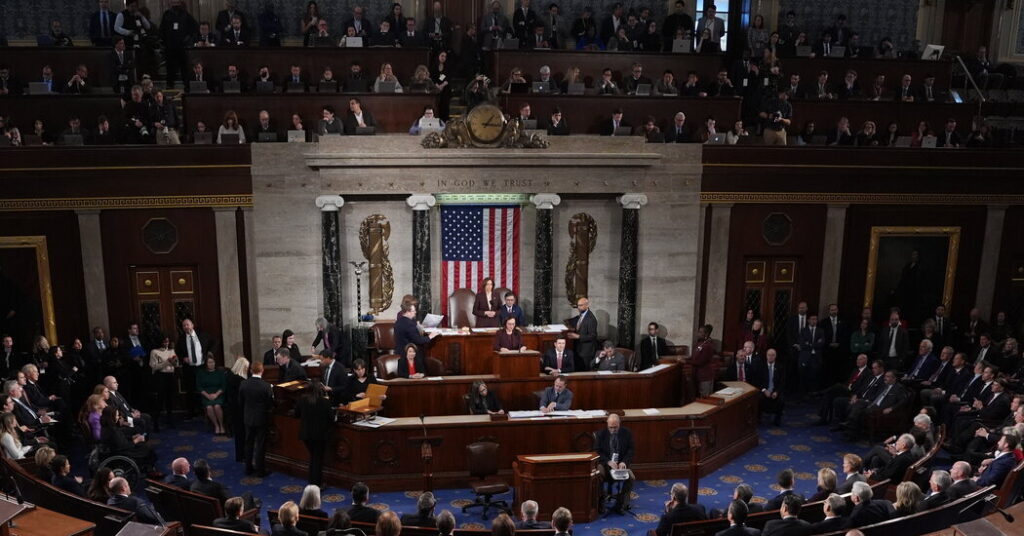Congress certified President-elect Donald Trump’s victory yesterday. Now that Republicans will hold the coveted “trifecta” — the White House, the Senate and the House — they’ll have their way in Washington, right? Maybe. The success of the Trump administration will hinge on congressional Republicans’ ability to stay united. It won’t be easy.
In the House, Speaker Mike Johnson, who was re-elected on Friday, will have the smallest majority in history: 217 to 215. That means every bill Republicans pass will need nearly unanimous support from his famously fractious conference.
In today’s newsletter, I’ll break down some of the disagreements that could define the new Congress — and potentially derail Trump’s agenda.
Spending is the issue that most divided House Republicans in recent years. Many of them say they came to Congress to cut federal spending and rein in the nation’s debt. So, unable to unite his conference around a spending plan, Johnson has instead relied on Democratic votes to pass important measures, from stopgap bills to avert government shutdowns to the aid package lawmakers approved for Ukraine. He argued such an approach was justified because he was dealing with a Democratic Senate and White House.
No longer.
Because Democrats are unlikely to vote for the Republican majority’s bills, Johnson will need to bring his whole conference along. But any measure that wins over the most anti-spending Republicans could alienate more centrist Republicans — and vice versa.
The lines can be fuzzy. Most House Republicans believe that the government should spend less. But they split over which programs should be slashed. Every state delegation has its own prerogatives to protect: New York Republicans, for example, resist cuts to Amtrak, while Iowa Republicans reject G.O.P. efforts to cut biofuel tax credits. Then there are ideological differences between hard-liners in safe seats who want to shutter entire agencies and the pragmatists in swing districts who view those plans as politically toxic.
Events will test intraparty comity almost immediately. The nation is set to default on its debt as early as January unless lawmakers raise or suspend the borrowing limit, a move ultraconservatives refused to support in December despite Trump’s urging. After that, Congress will hit another government funding deadline in March.
Even if House Republicans find a compromise, they must win approval in the Senate. Republicans there — especially centrists like Lisa Murkowski of Alaska and Susan Collins of Maine, who will chair the Appropriations Committee — have less appetite for giant spending cuts.
One solution could be for House leaders to accept the higher spending levels set by the Senate and try to get Democrats to supply some votes. That would most likely infuriate the hard-right Republicans.
The reconciliation bill
The big marquee fight this year is going to be Republicans’ drive to reshape the nation’s tax, budget and immigration policies through a process called reconciliation. It allows the Senate to pass bills with a simple majority, rather than the filibuster-proof 60 votes often needed for other measures.
Congressional Republicans believe that this is their best chance to ram through much of Trump’s agenda. They are eyeing one mammoth bill that would increase the nation’s borrowing limit, extend Trump’s 2017 tax cuts, cut federal spending and impose a wide-ranging immigration crackdown.
That is a lot of pressure to put on a single piece of legislation. And the reconciliation process is unwieldy.
Some members of the House Freedom Caucus, the ultraconservative clutch of lawmakers, have said they won’t support a reconciliation bill that ends up costing money. That means expensive measures will need to be offset by huge spending cuts. Extending the Trump tax cuts alone would cost roughly $4 trillion over a decade, for instance.
But moderate Republicans in both chambers aren’t interested in crippling programs like Medicaid and SNAP, two frequent G.O.P. targets.
And Republicans will have to agree on immigration policies that have bitterly divided them since the election. One wing of the party wants to recruit high-skilled workers to keep America competitive. The other thinks those workers take Americans’ jobs.
How will Johnson face these problems with a one-vote margin? He deadpanned in a news conference in December that he’d had a lot of practice working with a tiny majority: “That’s our custom.”
THE LATEST NEWS
Trump Transition
Opinions
Syria and Iran have long had a grip on Lebanese politics. With Assad gone and Hezbollah weakened, Lebanon has a chance to embrace a modern, diverse democracy, Michel Helou writes.
Where will you travel this year? The Times has published 52 Places to Go, an annual feature that highlights destinations across the U.S. and around the globe. Some made the list because of anniversaries, like southwest England, which is celebrating the 250th birthday of Jane Austen. Others are newly accessible, like the Nangma Valley of Pakistan, which now features an easy camping-based trekking route through its Yosemite-like granite peaks.
You can explore the full list here.
More on culture
THE MORNING RECOMMENDS …
Read the full article here


